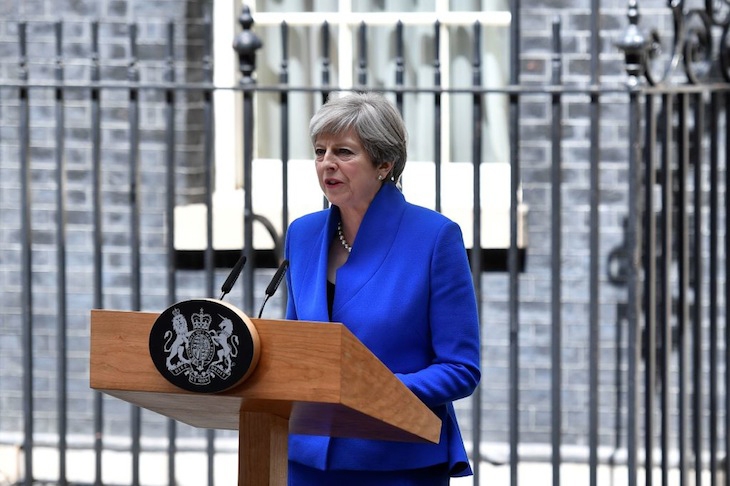If there is ever an inquest into who torpedoed Theresa May’s chances of winning the 2017 election outright, the answer should not be in doubt. The Prime Minister was the author of her own destruction – or, at least, the staggering and needless destruction of her party’s majority. The decision to hold an early election was taken not in political cabinet, but on a walking holiday with her husband. None of her cabinet colleagues advised her to personalise her campaign to such a bizarre extent; her disastrous manifesto was as much of a surprise to them as it was to the public.
Theresa May did all this herself, with a few handpicked aides – and if she had triumphed, she’d have governed in this way. She could justifiably have said that her approach had been vindicated. She would have won not only on a manifesto that was a product of her own brand of Conservatism, but also thanks to her operating style. Now that gamble has ended in calamity.
May is left with a dazed party that just a few weeks ago was expecting to destroy Labour in its heartlands; instead it has ended up being routed in its own. Even Kensington & Chelsea was wobbling at the time of writing. It has left Tories all asking the same question: what on earth happened?
The shell-shocked staff at Tory HQ feel that three things went wrong. First, the public is fed up with austerity. Rather than the structural deficit being abolished by 2015, as was the plan, it still exists – indeed, Mrs May gave herself another ten years to balance the books. With the Tories taking the deficit off the table as an issue, they had no response to Jeremy Corbyn’s promise to spend more on pretty much everything. The economy is the Tories’ strongest card, yet it was not played in this campaign. An inexplicable act of negligence.
Second, Mrs May had based her strategy around Brexit animating Leave voters still – but it has failed to do so. Voters could not quite understand the need for this election, or why — having won so many Brexit votes — the Prime Minister suddenly claimed that her opponents represented a threat that could only be resolved with a fresh election. The Liberal Democrats made a similar miscalculation, expecting to benefit from a desire for a second referendum; like the PM, they were left disappointed by this morning’s results.
But perhaps, most importantly, Theresa May was not who voters imagined her to be. The public liked her because they thought she was a different kind of politician: honest, direct, unfussy and not worried about popularity. However, during this campaign, she looked like a typical politician – repeatedly refusing to answer questions – and an uncharismatic one at that. She turned out to be an atrocious campaigner, who struggled to move beyond cliché and banality. The so-called ‘dementia tax’ also made many elderly and right-leaning voters question her values, with many arguing it was a profoundly un-Conservative move.
The U-turn on that torpedoed her reputation for ‘strong and stable’ leadership – which was the only card that she was playing. And the U-turn itself was made worse by her attempt to claim it was no such thing. It hurt her because it exposed one of her greatest weaknesses: she runs away from making and winning arguments.
Tory ministers add two other things to this list. They point out that the party unilaterally disarmed. While Labour was enthusing its youth base with a promise of free university tuition, the Tories were scaring their own with a radical social care policy and a promise to take the winter fuel allowance away from most pensioners. Secondly, they add that the campaign was a disgraceful shambles, run by a tight clique who didn’t listen to advice and repeatedly made bad decisions. They point to the fact that the party won the local elections handsomely just months ago.
With the DUP’s support — which will be obtainable at a price — the Tories will probably just be able to cobble together some kind of governing arrangement. Some think this means that May must stay on; even if her whole style of government will have to change. But others in the cabinet feel that she went to the country early, seeking a majority and a mandate and failed on both counts, so must go. Also: who would replace her? Philip Hammond isn’t more charismatic. David Davis is tainted by having urged her to hold the election in the first place. Boris Johnson hasn’t quite been forgiven for Brexit by half of the country. Amber Rudd enhanced her reputation, but reduced her majority. Ruth Davidson’s reputation has been enhanced after the extraordinary results in Scotland — but she isn’t even an MP.
In the speech at her own Maidenhead count, Theresa May said that the country needs a period of stability. The irony of all this, is that the need for stability was why she used to say that she wouldn’t hold an early election. A few months ago, we had stability: now we don’t. And this may end up being Theresa May’s legacy. She might remain as Prime Minister, but her authority vanished in the early hours of this morning. And she has no one but herself to blame.







Comments